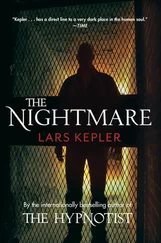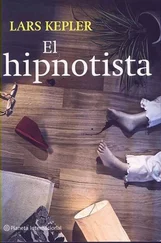Lars Kepler
The Fire Witness
All liars shall have their part in the lake which burneth with fire and brimstone...
— REVELATION 21:8
Elisabet Grim is fifty-three years old. Her hair is streaked with gray, but her eyes are bright and happy, and when she smiles, one of her front teeth juts out impishly.
She is a nurse at Birgittagården, a state-approved home for especially troubled girls north of Sundsvall. It’s a small, privately owned residence. Rarely are there more than eight girls there at a time. They range from twelve to seventeen in age. Many are drug addicts when they arrive. Almost all have a history of self-injury — eating disorders, for instance. Some can be violent. For these girls, there is no alternative to Birgittagården, with its alarms and double-locked doors. The next step would be prison or forced confinement in a psychiatric unit. This home, by comparison, is a hopeful place, with the expectation that the girls can make it back someday to open care.
As Elisabet often says, “It’s the nice girls who end up here.”
Right now, Elisabet is savoring the last bite of a bittersweet bar of chocolate. She can feel her shoulders begin to relax.
The day started well but the evening was hard. There were classes in the morning, and in the afternoon, the girls spent time at the lake. After the evening meal, the housemother went home, leaving Elisabet in charge on her own. The night staff was recently let go when the company changed hands. Elisabet had sat in the nurse’s office, catching up with reports, while the girls watched television, which they were allowed to do until ten.
And then she’d heard the yelling. It was loud, very loud. She’d hurried to the television room, where Miranda was beating up tiny Tuula. Miranda was screaming that Tuula was a slut and a whore. She’d yanked the little girl off the sofa and was kicking her in the back.
It was not unusual for Miranda to explode violently. Elisabet was used to her outbursts. She pulled her away from Tuula, and Miranda slapped Elisabet in the face. Elisabet was used to that, too. Without further discussion she led Miranda down the hall to the isolation room. Elisabet wished Miranda a good night, but Miranda didn’t answer. She just sat on the bed and studied the floor with a secretive smile as the nurse shut and locked the door behind her.
Elisabet was scheduled to have a private talk with the new girl, Vicky Bennet, but after the conflict, she found she was exhausted and couldn’t face it. When Vicky came by and timidly mentioned that it was her turn for a chat, Elisabet put her off. This made Vicky so unhappy, she broke a teacup and slashed her stomach and wrists with the sharpest piece.
When Elisabet checked on her a while later, Vicky was sitting in her room with her hands in front of her face and blood running down her arms.
The wounds were superficial. Elisabet washed the blood off, wrapped gauze around the girl’s wrists, and put a Band-Aid on her stomach. And Elisabet comforted her, soothing her with sweet names, telling her not to worry, coaxing her until a tiny smile crossed the troubled girl’s face. For the third night in a row, Elisabet gave the girl ten milligrams of Sonata so she could sleep.
All the girls are finally asleep and Birgittagården is quiet. Outside the office window, the September darkness has settled on the forest, but Himmelsjö Lake’s smooth surface shines like mother-of-pearl. Elisabet sits in front of her computer entering the evening’s events into the log.
It’s almost midnight and she realizes she hasn’t taken her sleeping pill yet. My own little drug , she calls it. Difficult days followed by nights on call are interfering with her sleep. She needs a few hours of rest; ten milligrams of Stilnoct by ten and she’s asleep by eleven. She pulls her shawl tight and thinks that a glass of red wine would hit the spot right now. She longs for her own bed, where she can curl up with a book, or with her husband, Daniel. But not tonight; she’s on call and has to stay here.
In the yard outside, Buster begins to bark. Insistently, stridently.
It’s very late. She’s usually asleep by now. She takes her pill, shuts down her computer. She grows aware of the sounds she’s making: the hiss of her chair’s hydraulic lift as she stands; the creak of the tiles beneath her feet as she moves to the window. She tries to look out, but all she can see is the reflection of her face. And of the door gliding open behind her.
Must be the draft , she thinks. The tile stove in the dining room draws such a great deal of air.
She shakes off the disquiet she feels and switches off the lamp before she turns around.
Now the door is wide open. She shudders faintly, and steps through it. The lights are on in the hallway between the dining room and the girls’ bedrooms. I should check the tile stove , she thinks; make sure the lids are shut . But there is whispering coming from one of the bedrooms.
At first all Elisabet hears is a delicate hiss. The whisper is hardly perceptible. Then she hears words.
“It’s your turn to close your eyes,” someone murmurs.
Elisabet keeps still, staring so hard down the hall her eyes are frozen open. It must be one of the girls talking in her sleep , she thinks. Then there’s a noise, like an overripe peach dropping on the floor. Then another, heavy and wet. A table leg scrapes the floor and there’s the sound of two more peaches falling.
Out of the corner of her eye, Elisabet catches a movement, a shadow gliding past. She turns around and sees the door to the dining room slowly close.
“Wait!” she calls out, even while trying to convince herself it’s nothing; it must be the draft.
She grabs the doorknob to the dining room, but something stops the door from opening and she has to yank it before it finally gives way. Stepping inside, she can see herself in the dull reflection from the scratched dining-room table, and again in the brass fire doors of the tile stove. She checks it: the lids are all shut. The stove suddenly knocks, and Elisabet takes a quick step back, tilting over a chair. It’s nothing. Just the slipping of a log.
She heads to her room, pausing outside the girls’ bedrooms. She detects a sour, slightly metallic aroma. She searches for movement in the hallway, but all is still. To the right are the bathrooms and the alcove leading to the isolation room. Miranda should be fast asleep in there. The peephole in the door glimmers weakly.
Now, again, there’s that light voice, whispering.
“It’s time to be quiet,” Elisabet calls out.
A series of quick thuds. It’s hard to locate the noise, but it sounds as if Miranda is lying in bed and kicking her bare feet against the wall. Elisabet decides to check on her through the peephole. It is then that she sees a shadowy figure in the alcove. With a gasp, she backs away. She knows how dangerous the situation is, but fear makes her slow; her body feels as if it’s moving in the heavy water of a dream. But the creaking of the floor startles her awake, and she whirls around and starts to run.
A soft voice behind her urges her to stop, but she knows she mustn’t.
Elisabet makes it to the front door. Throwing the lock, she races out into the cool air of the night. She slips on the front steps, smacking her hip and twisting a leg beneath her. Her ankle hurts so badly she cries out, and she crawls for a stretch, losing her slippers. Then she forces herself to her feet.
The dog is barking at her. He runs circles around her as she limps away across the gravel driveway. She knows there is no escape in the forest, and it’s several hours’ walk to the closest farm, so she drags herself behind the drying shed, toward the former brewery. Hands shaking, she opens the door, slips inside, and pulls the door tight.
Читать дальше
Конец ознакомительного отрывка
Купить книгу












